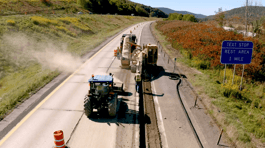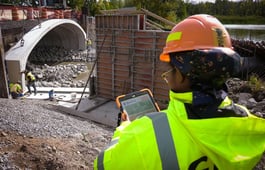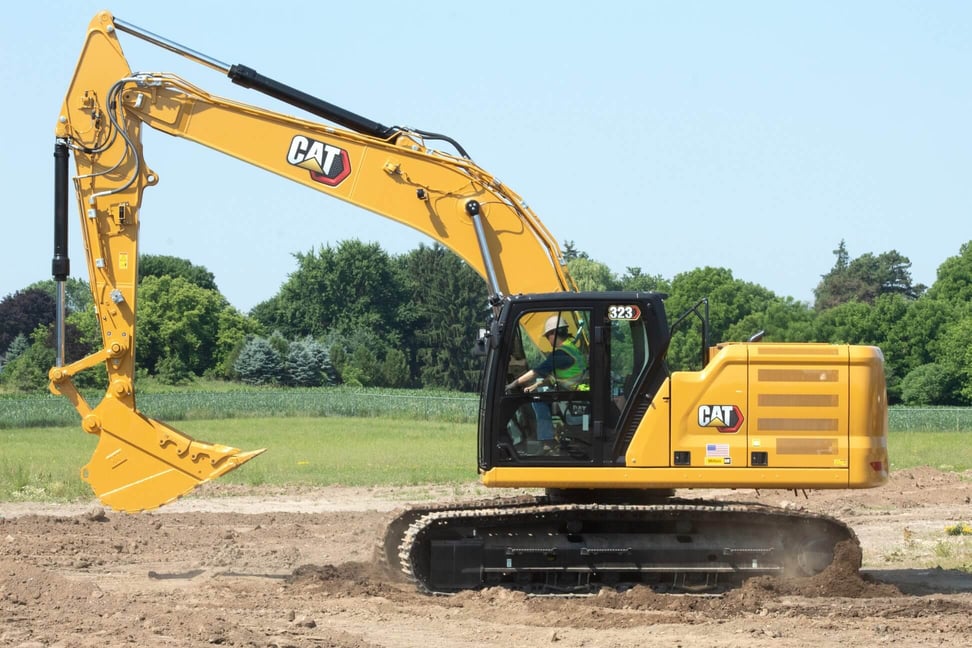
Heavy equipment operators are essential in construction, mining, forestry, and many other industries. They operate construction equipment such as bulldozers, backhoes, excavators, and dump trucks to move materials and complete projects. Those heavy-duty vehicles perform many construction tasks involving earthmoving, demolition, and lifting.
But operating heavy equipment isn't as simple as driving a car or truck, and it requires much more than just being able to push buttons and steer a machine. To become an efficient, safe, and successful heavy equipment operator, you need special training, education, and qualifications.
If you're interested in breaking into this in-demand career field, or if you're already in the industry but looking to level up your skills, this heavy equipment training guide will give you all the information you need.
Who needs heavy equipment training?
In short, anyone who wants to safely operate heavy equipment must have training and education in working with the machinery they will be using. This includes earning certifications, licenses, and qualifications demonstrating their expertise and competence.
Employers prioritize hiring those with formal training, as it reduces the risk of accidents and damage on the construction site. OSHA (the Occupational Safety and Health Administration) regulations require that workers operating certain types of heavy equipment receive training in safe operation and the specific mechanics of the machinery, as well as knowledge of industry standards and regulations.
Here are the top certifications, qualifications, and accolades that employers look for in heavy equipment operator trainees:
- Valid driver's license - In order to operate heavy equipment, you must have a valid driver's license and a clean driving record.
- OSHA certification - To work in a construction or industrial setting, you must be familiar with OSHA regulations and standards for safe equipment operation.
- Industry-specific certifications - Many employers require that heavy equipment operators have certifications from organizations like the National Center for Construction Education and Research (NCCER) or the National Mining Association (NMA).
- Experience and skill - Employers often look for candidates with previous experience working with heavy equipment, and who have a demonstrated ability to operate these machines safely and efficiently.
- Leadership skills - Beyond technical expertise, employers seek candidates who can lead and motivate their teams, demonstrate good judgment, and work well under pressure. Heavy equipment operators must be able to think quickly on their feet and stay cool under pressure, in order to respond effectively to changing conditions on the job site.
Finally, it's important to remember that proper training isn't just a requirement for getting hired - it's also crucial for the safety of operators, coworkers, and anyone else on the job site.
What do heavy equipment operators do?
The simple answer is they use machinery to complete tasks related to construction and demolition. However, there are many types of heavy equipment, and each type requires a specialized skill set from the operator.
On an average day, a heavy equipment operator might use an excavator to dig a foundation for a building or operate a bulldozer to clear land for construction. They may also work with crane operators to lift and move materials and use dump trucks to transport materials from one location to another.
Some operators specialize in one type of machinery, while others have experience operating a variety of heavy equipment. The specific tasks and projects you can work on vary widely based on your industry and your employer's needs. You may even work on pipelines, operate snowplows in the winter, or run forestry equipment.
As a heavy equipment operator, your duties include inspecting your equipment before use, following safety measures, and completing tasks according to project plans and specifications. You may also be responsible for performing regular maintenance, keeping track of necessary repairs, as well as some administrative tasks, such as completing job related paperwork.
Heavy equipment operators are often first on the job site, starting projects and laying the groundwork for other workers to complete their tasks. At the end of a project, they can be responsible for cleanup and finishing work.
Different types of heavy equipment
The types of heavy equipment you will operate depend on the industry you work in and the specific tasks and projects at hand. However, some common types of equipment include:
- Bulldozers: used for pushing and moving large quantities of materials, often in construction, mining, and forestry industries.
- Excavators: used for digging, lifting, and moving materials and demolition.
- Cranes: used for lifting and moving heavy materials, often on construction sites.
- Forklifts: commonly seen in warehouses and distribution centers, used for lifting and transporting materials.
- Dump trucks: primarily transport loose materials such as dirt, gravel, and demolition debris.
- Backhoes: similar to excavators, used for digging and moving materials, often in construction and farming industries.
- Loaders: used for loading materials, often onto dump trucks or storage areas.
- Asphalt pavers and rollers: used for laying and smoothing asphalt on roadways and other surfaces.
- Scrapers: often used in mining, construction, and farming industries, usually for moving and removing large quantities of materials.
- Skid steers: skid steer is a versatile machine used for various tasks, including digging, loading materials, and demolition.
- Road graders: used for leveling and maintaining dirt or gravel roads.
These are just some examples of the many types of power equipment out there. As technology advances and industries continue to evolve, new types of machinery are constantly being developed.
That said, there are also specialized pieces of the heavy equipment you can work with, such as snowplows, forestry equipment, and underground drilling machinery. As an operator, it's essential to have knowledge of all the different types of machinery you may be asked to operate, as well as their specific functions and safety protocols.
Various kinds of heavy equipment operators
In addition to the equipment you can work with, your daily duties will also depend on what kind of operator you become.
Some common specializations include:
General equipment operators
General equipment operators are responsible for operating various heavy equipment, as needed in their industry and job site. They may build new residential districts, work with bulldozers to clear a construction site, operate forklifts to move materials, or use dump trucks for hauling debris.
As a general equipment operator, your versatility is crucial to success in the field. You need to be familiar with the various types of equipment, their specific functions, and any safety protocols related to their operation.
Excavator operators
As an excavator operator, your main duty is operating a large piece of equipment called an excavator. These machines are used for digging, lifting and moving materials, demolition, and other tasks requiring precision and strength.
For example, excavator operators play a significant role in projects such as:
- Constructing commercial and residential buildings
- Clearing land for new industrial parks or roadways
- Repairing and maintaining existing infrastructure, such as tunnels, bridges, and dams
- Demolishing buildings or other structures
- Removing large amounts of earth to facilitate mining operations
In addition to operating the excavator, your job may involve coordinating with a team and other equipment operators to complete tasks efficiently and safely. Excavator operators need to have knowledge of the specific excavator they're operating, including any safety protocols and maintenance responsibilities.
Paving and surfacing operators
Paving and surfacing operators primarily work with asphalt pavers and rollers, which are used for laying and smoothing asphalt on roadways and other surfaces. Their job includes operating the machinery, coordinating with a team, and ensuring the quality and smoothness of the finished surface.
They participate in projects such as constructing new roads and highways, including ramps, bridges, and overpasses, repairing existing roadways that have been damaged, and sealing and patching roads to extend their life span or improve surface quality.
To succeed in this specialization, you must have a thorough understanding of asphalt paving processes and techniques, as well as the specific machinery you'll be operating.
Material handling operator
Material handling operators use various types of heavy equipment, such as forklifts and cranes, to move materials in different industries. Their job involves operating the machinery and coordinating with a team to ensure an efficient and safe material handling processes.
In addition to knowledge of the specific machinery they operate, material-handling operators also need to understand industry and job site safety protocols and know proper lifting techniques to avoid injury.
Many of the specializations within the field of heavy equipment operator training come with certain risks and hazards. For example, excavator operators may be exposed to loud noises, vibrations, and stress from operating large machinery. Additionally, they may need to work in tight spaces or hazardous conditions such as wet locations or underground mines.
Other specializations, such as paving operators and material handlers, may also be exposed to workplace hazards like heavy lifting, working in extreme temperatures, or exposure to chemicals or fumes. To minimize these risks, operators need to follow industry guidelines and safety protocols when operating machinery. Additionally, they should always use personal protective equipment (PPE) such as ear plugs, respirators, and safety goggles to help protect against injuries or exposure to hazardous materials.
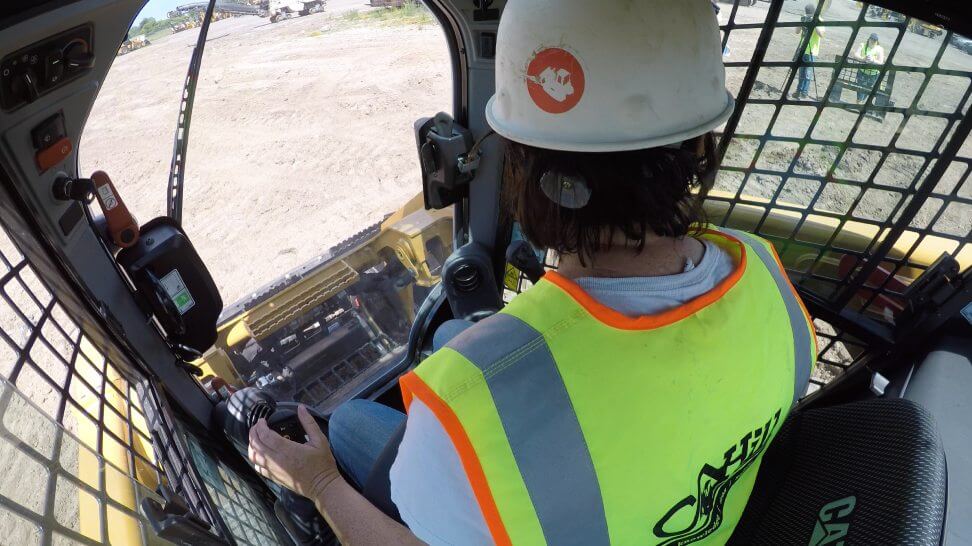
How to become a heavy equipment operator
Now that you better understand the various types of heavy equipment and specializations, let's talk about how to become a heavy equipment operator.
One option is to get on-the-job training from a company or employer. This can be a great way to gain hands-on experience and learn the ins and outs of the specific equipment and industry you'll be working in. However, it's important to note that many employers prefer or require operators with formal training and certification.
Another option is to enroll in a heavy equipment operator school or program. These programs offer comprehensive heavy equipment training and prepare you for industry certifications, making you more attractive to potential employers. They often last several months, but the actual price and length of these programs will vary depending on the school or program you choose. To find the best options for you, consider researching different schools and programs online or talking to industry professionals for recommendations.
You can also go through a formal apprenticeship program. They typically involve both classroom instruction and hands-on experience operating various types of equipment. They last anywhere from a few months to several years, depending on the program and apprenticeship requirements. Upon completing the program, you may have the opportunity to earn certification in your chosen specialization.
Apprenticeship programs can be an excellent option for gaining experience and formal certification. To get started, you can contact local companies or employers to find out more about their apprenticeship programs. You may also be able to find apprenticeship opportunities through organizations like the International Union of Operating Engineers or the Construction Education Foundation.
No matter which route you choose, it's important to keep in mind that operating heavy equipment requires high responsibility and safety awareness. Having the necessary skills and training can make you more confident, more successful, and help ensure the safety of yourself and those around you.
Education, certifications, and training
You will likely need to have a high school diploma or equivalent to land a job as a heavy equipment operator. Basic math, reading, and communication skills are also essential for job success. While some employers prefer or require operators to have formal training and certification in their chosen specialization, many are willing to work around your education or experience if you have the right mix of skills and motivation.
Various certifications are available, such as those offered through the National Commission for the Certification of Crane Operators (NCCCO) or the Associated General Contractors of America (AGC). Research and understand the specific certification requirements in your chosen specialization and ensure you have the necessary training and experience before taking the certification exam, as passing the test is typically required in order to receive a certification.
In addition to formal education and certifications, ongoing training will get you places in this field. As new equipment and technology are introduced, operators must stay updated on industry advancements and best practices. Employers may offer regular training opportunities or allow you to attend workshops or conferences to expand your knowledge and skills.
Qualifications and necessary skills
In addition to the education, certifications, and training mentioned above, there are a few key qualities and skills necessary for success as a heavy equipment operator.
First and foremost, you need to have a strong commitment to safety. Operating heavy equipment requires attention to detail and following all safety protocols. You also need to be able to anticipate potential hazards and take preventative measures when necessary.
Physical strength and stamina are also important for operating heavy equipment, as well as the ability to work long and potentially strenuous hours.
A good understanding of equipment maintenance and troubleshooting is necessary to ensure smooth operation and prevent potential accidents or downtime. Effectively communicating with teams and clients on job sites is another critical aspect of the job.
Overall, having a combination of education, training, and the right skills can help set you on a successful career path as a heavy equipment operator. And, with the growing demand for infrastructure development and construction projects, now is a great time to break into this field.
Job Outlook
According to the Bureau of Labor Statistics, employment for heavy equipment operators is projected to grow 5% from 2021-2031. About 50,800 openings for construction equipment operators are projected each year, on average, over the decade.
As the baby boomers retire and leave the construction industry, there is a growing need for skilled workers in this field. This generation will grow up without the traditional apprenticeship model that previous generations have experienced, which makes it even more important to have strong educational and training opportunities to help prepare them for success in this field.
With this growing demand for infrastructure development and construction projects, there are many great career opportunities for those with the necessary skills and training to succeed as heavy equipment operators. Whether you're interested in working in the private sector or public works projects, this is an exciting time to break into this field and build a rewarding career. And with competitive salaries, benefits packages, and long-term job stability, the future looks bright for heavy equipment operators.
Heavy equipment operator salaries
Let's talk money!
One of the most common questions about a heavy equipment operator career is: "How much can I make?"
Because of the nature of the job, long working hours, and flexible schedules, operators are often paid by the hour instead of a traditional salary. According to the Bureau of Labor Statistics, the average hourly pay to operate heavy equipment falls between $28 and $38 in 2022. This means that the median annual wage for operators is around $63,000/year, with a spread of $53,000 to $73,000/year.
Of course, salaries can vary based on location, years of experience, and specific job duties. For example, crane operators typically earn higher salaries, up to $98,490/year.
With the combination of growing job opportunities and competitive salaries, a career as a heavy equipment operator can provide stability and potential for advancement. And with the necessary education, certifications, training, and skills - you can set yourself up for success in this field.
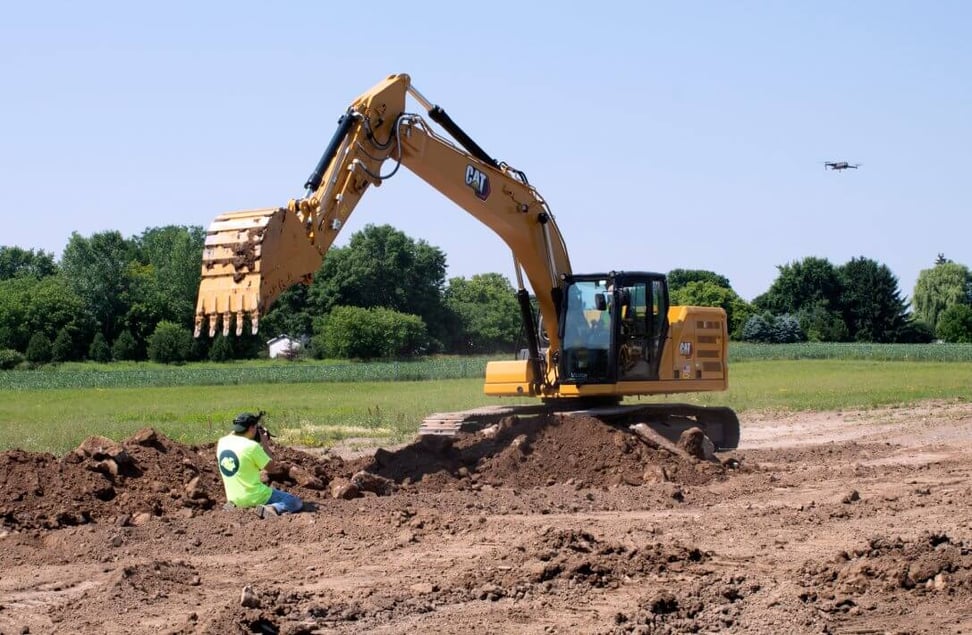
How to get a job as a heavy equipment operator?
So, now that you know about heavy equipment operators' education, qualifications, and job outlook, how do you actually break into the field?
Here are a few tips:
1. Get the necessary education and training
It would help if you had the right credentials and qualifications to make yourself a competitive job candidate. This can include completing a formal heavy equipment training program, obtaining certification, and gaining hands-on experience through apprenticeships or internships. We've already mentioned some great resources to get started, including industry associations and online training programs.
2. Network and build connections
In any industry, networking is key to finding job opportunities and advancing your career. One way is to join industry groups and associations, attend job fairs, events, and conferences, and connect with other operators on social media platforms like LinkedIn, who can provide helpful advice and potentially even refer you to job openings. CAHill TECH team will be happy to help you with any questions you might have or connect you to potential employers.
3. Build your resume and showcase your skills
Your resume and application materials are key to getting your foot in the door at companies or organizations. Be sure to highlight your education, training, certifications, and any relevant work experience. Don't forget to showcase your specific skills and qualifications - such as operating certain types of equipment or having a commercial driver's license. If you're not sure how to put your experience down on paper, there are plenty of resume builders and resources online that can help you get started, such as Canva.com, Resumegenius.com, or Resume.io.
4. Stay up to date on industry technology
With the growing use of technology, you need to stay current on advancements in the industry. This can include training on operating new equipment and using computer software relevant to your job duties. Some useful resources for learning about new technology include vendor websites, industry publications, and online forums and groups.
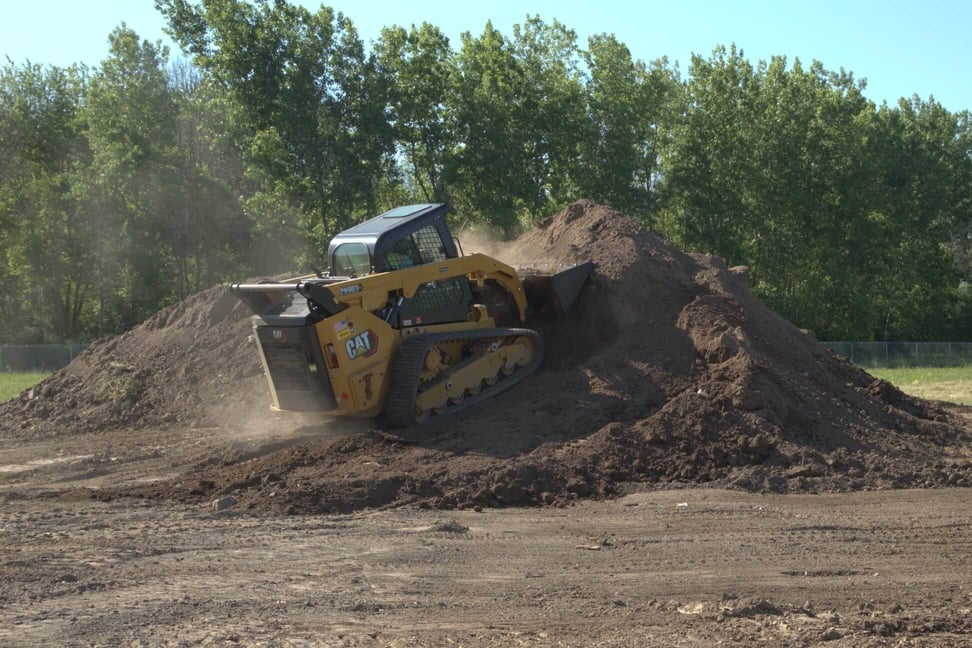
Online heavy equipment operator training courses
Online heavy equipment operator training courses are becoming increasingly popular, as they allow learners to gain the skills and knowledge needed to be successful in this field from anywhere, at any time.
These courses are ideal for anyone looking to break into the field, as they provide a convenient and flexible way to gain the knowledge and skills needed to succeed as a heavy equipment operator. They can be especially useful for those who need to balance work and family obligations or live in areas with limited training opportunities.
Some of the benefits of online heavy equipment operator training courses include the following:
- Convenience and flexibility - With a wide selection of online courses, you can choose the learning method that works best for you. Whether you prefer self-paced learning, live webinars, or recorded content, there is an option to suit your needs and schedule.
- Access to high-quality content - Many online courses are developed by industry experts with years of experience operating and training others to operate heavy equipment. This means you can be confident in the quality and accuracy of what you learn.
- Reduced costs - Online learning often costs less than traditional classroom training, which can be especially beneficial if you are on a tight budget or looking to gain additional certifications outside your current program. In addition, many courses are available at a discount or even free through group rates or scholarships.
Whether you decide to pursue a formal degree or certificate program, or take some online courses to build your skills and knowledge, there are many benefits to pursuing heavy equipment operator training. With the right credentials and connections, you can be well on your way to a successful career in this exciting field.
Final words
Before you embark on your training journey, you must decide if this career is the right fit. Heavy equipment operators must have physical strength and stamina, excellent hand-eye coordination, and the ability to work well under pressure and follow safety guidelines.
It requires a lot of hard work and dedication, but if you have a passion for operating equipment and are up for the challenges, a career as a heavy equipment operator can provide stability and opportunities for advancement. You will be at the forefront of constructing our cities and communities, making a real impact on the lives of others. And with the right education, training, qualifications, and skills - you'll be on your way to success!
At CAHill TECH, we offer heavy equipment training through our aQuiRe™app. The aQuiRe™ app has a growing library of over 300 training modules, quizzes and certifications, short videos from real job sites, machine inspection surveys, and equipment checklists.
To learn more about aQuiRe™, visit CAHill TECH or book a free demo here.

